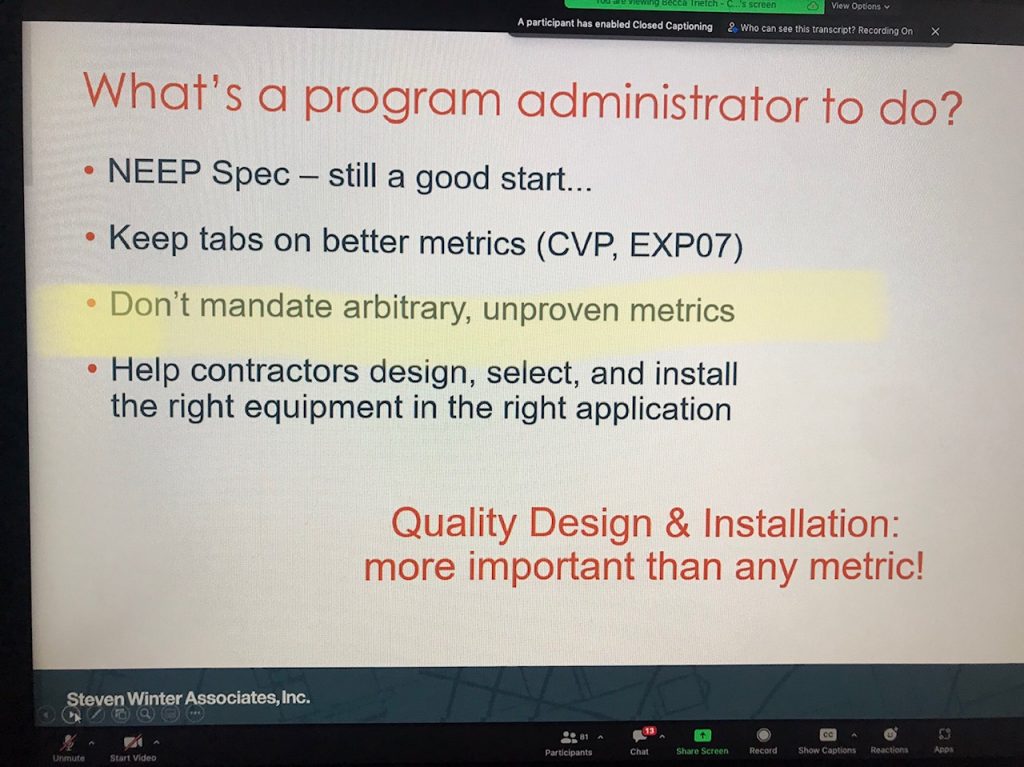Top environmental, sustainability engineer tells state regulators: “Don’t mandate arbitrary, unproven metrics” regarding heat pumps and how they might work in cold weather
Contact Shelly Sindland, 860-992-9045, shellysindland@ctema.com
For Immediate release:
The Connecticut Department of Energy and Environmental Protection’s plan to mandate electric heat pumps in Connecticut homes and businesses—in place of heating oil, natural gas and propane—took a big hit today after an environmental engineer, who specializes in green energy and building construction, urged them not to mandate something that may not work in cold weather.
“It’s harder to pull heat out of cold air,” said Robb Aldrich, a principal mechanical engineer with Steven Winter Associates, Inc., based in Norwalk, Connecticut. According to its website, the company specializes in green and energy efficiency construction for both new and existing buildings.
Electric heat pumps work by pulling heat out the air to heat your home but Aldrich testified that there is no real data to show how heat pumps would perform in cold weather—except for studies done in labs, and not in a real-weather environment where many factors would play a role in their efficiency. Aldrich’s last slide in his presentation during today’s hearing by DEEP concerning its plan to decarbonize the economy with its Comprehensive Energy Strategy (CES 2022) sent a clear message to regulators.

“Don’t mandate arbitrary, unproven metrics,” Aldrich’s wrote for his presentation.
Heat pumps work better in warmer environments. Connecticut Energy Marketers Association president, Chris Herb, said Aldrich’s testimony proves the state’s plan to limit consumer choices when heating their homes and businesses just doesn’t add up or make any practical sense.
“I understand the state’s desire to lower greenhouse gas emissions but this plan has it all wrong. We can’t have people freezing in the wintertime when their heat pump gives out. Connecticut winter’s can be extremely cold and people could die if this plan moves forward. It is mind boggling.”
Herb said consumers should be able to pick what works best for their families to heat their homes, and should also be given multiple options and not just ONE option to heat their homes. Under the state’s Comprehensive Energy Strategy, electric heat pumps would pretty much be the only option moving forward.
“Our 600 home heating oil companies work really hard to keep people safe and warm. If the state has its way, they’ll be out of business and then what? Last winter, it was our guys who kept the electricity grid up and running during those cold winter months. Our guys were driving truckloads of fuel to the utilities to keep them from going dark. Without us, there would have been some really cold and hard days for people in our state.”
Herb also pointed out that home heating oil in Connecticut is much cleaner and greener than it was even 10 years ago. All heating oil in the state is ultra low sulfur (which means the sulfur has pretty much been removed) and it’s mixed with a green, renewable fuel called biodiesel. Biodiesel is made from recycled food waste including restaurant oil and soybean oil.
“Fuel diversity is key,” Herb said. “We need multiple green fuels at the table to help the state reach its goal of lowering emissions but putting all of our energy eggs in one basket with electricity being the only option is both dangerous and not sustainable.”
Other takeaways from today’s hearing:
- Converting to an electric heat pump will cost consumers more money upfront, and during the life cycle of its use, compared to heating oil by as much as $20,000.
- Massachusetts Clean Energy Center had a whole home pilot program for electric heat pump conversions. The pilot program found that “costs were higher than we hoped,” according to director Meg Howard.
- The cost of retrofitting a home with a heat pump averaged $20,428 for a 1502 square foot home.
- 25% required electric service upgrades.
- 38% still had to use natural gas to heat water.
- Bob Wirtshafter, with CT Energy Efficiency Evaluation Team, also testified regarding heat pumps reliability: “We don’t know how well heat pumps work in very low temperatures.”
